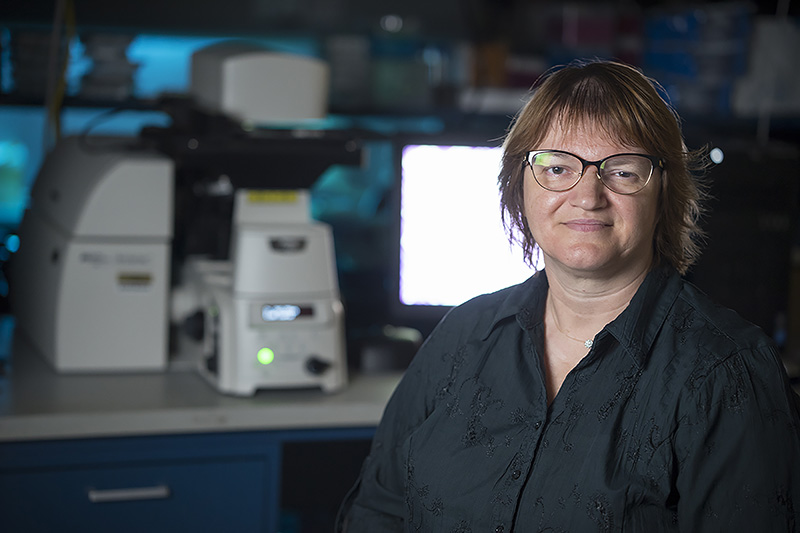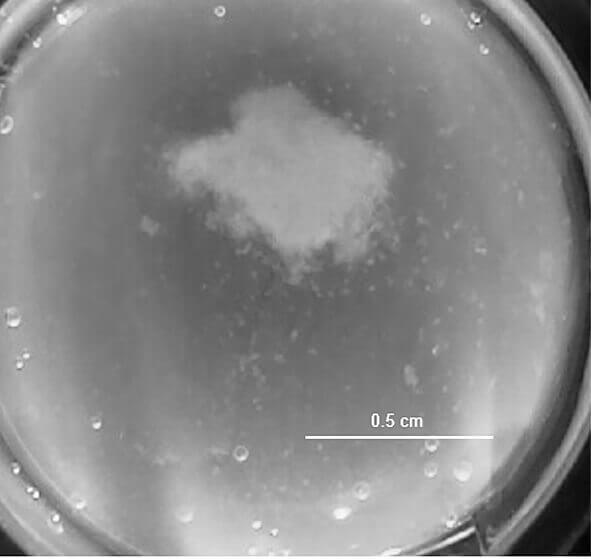August 20, 2019
‘A first for cancer research’: New approach to study tumors
 Sophie Lelièvre, a professor of cancer pharmacology at Purdue University, is leading a team of scientists to create tumor models in 10 days that are much closer in size to the ones found in the body and readily mimic the pathological characteristics of human cancers. (Image provided)
Download image
Sophie Lelièvre, a professor of cancer pharmacology at Purdue University, is leading a team of scientists to create tumor models in 10 days that are much closer in size to the ones found in the body and readily mimic the pathological characteristics of human cancers. (Image provided)
Download image
WEST LAFAYETTE, Ind. – Current drugs to treat malignant tumors may be successful at reaching the tumor site but often fail to fully reach the cancerous cells in tumors.
The problem persists because tumor models used in cancer research and produced by cell culture in laboratories are not nearly the size of the actual tumors in patients. So even when a drug appears to be effective in the tiny tumors in research labs, they may perform much differently for patients.
Now, Purdue University cancer scientists are creating tumor models in 10 days that are much closer in size to the ones found in the body and readily mimic the pathological characteristics of human cancers.
“This is a first for cancer research,” said Sophie Lelièvre, a professor of cancer pharmacology in Purdue’s College of Veterinary Medicine. “For the first time we have created tumor models in the laboratory called macrotumors that are 0.5 to 1 centimeter in width and 1.5 centimeters in height. This is much closer to the size of small tumors detectable in patients, and remains viable for days, even weeks, enabling therapeutic drug testing.”
Reaching such large tumor size in vitro was possible thanks to scaffolds prepared by Rahim Rahimi, an assistant professor of materials engineering in Purdue’s College of Engineering. The scaffolds also enable peeling pieces of the large tumor for various types of analyses.
Lelièvre said that typical tumor models produced in the laboratory in three-dimensional (3D) cell culture are between 400 and 800 micrometers. When produced in vivo, in mice, tumors in the centimeter size take weeks to grow and cannot be studied in a controlled microenvironment like in 3D culture; and the production is costly.
 This image shows a breast macrotumor of invasive ductal carcinoma type embedded in gel. (Image provided)
Download image
This image shows a breast macrotumor of invasive ductal carcinoma type embedded in gel. (Image provided)
Download image
“In addition to a comparable size of tumors, our in vitro models are valuable because they maintain the structure of the tumors as found in the body, and we can decide which microenvironmental characteristics of cancer to recapitulate,” said Lelièvre, coleader of the Drug Discovery and Molecular Sensing Program of the Purdue Center for Cancer Research. “This is critical for testing drug delivery and finding medicines that readily target the cancerous cells in tumors and help save lives. It’s another step forward in the pursuit of precision medicine.”
Lelièvre said the novel tumor design was made possible because Purdue cancer researchers from across disciplines come together with support from the Purdue University Center for Cancer Research and the 3D Cell Culture Core (3D3C) Facility of the Birck Nanotechnology Center in Purdue’s Discovery Park.
“The 3D3C is really a unique facility that you won’t find anywhere else in the world,” said Lelièvre, who initiated 3D3C in 2015 and serves as the scientific director for the facility. “We are able to bring together engineers and biologists to create models based on 3D cell culture, including tumor models, which help move research forward to the people who need it most.”
The technology is being patented through the Purdue Research Foundation Office of Technology Commercialization. The scientists are looking for partners to test and commercialize their technology.
Their work aligns with Purdue's Giant Leaps celebration of the university’s global advancements in health as part of Purdue’s 150th anniversary. It is one of the four themes of the yearlong celebration’s Ideas Festival, designed to showcase Purdue as an intellectual center solving real-world issues.
About Purdue Research Foundation Office of Technology Commercialization
The Purdue Research Foundation Office of Technology Commercialization operates one of the most comprehensive technology transfer programs among leading research universities in the U.S. Services provided by this office support the economic development initiatives of Purdue University and benefit the university's academic activities through commercializing, licensing and protecting Purdue intellectual property. The office is managed by the Purdue Research Foundation, which received the 2016 Innovation and Economic Prosperity Universities Award for Innovation from the Association of Public and Land-grant Universities. For more information on licensing a Purdue innovation, contact the Office of Technology Commercialization at otcip@prf.org. For more information about funding and investment opportunities in startups based on a Purdue innovation, contact the Purdue Foundry at foundry@prf.org.The Purdue Research Foundation is a private, nonprofit foundation created to advance the mission of Purdue University.
Writer: Chris Adam, 765-588-3341, cladam@prf.org
Source: Sophie Lelièvre, lelievre@purdue.edu

